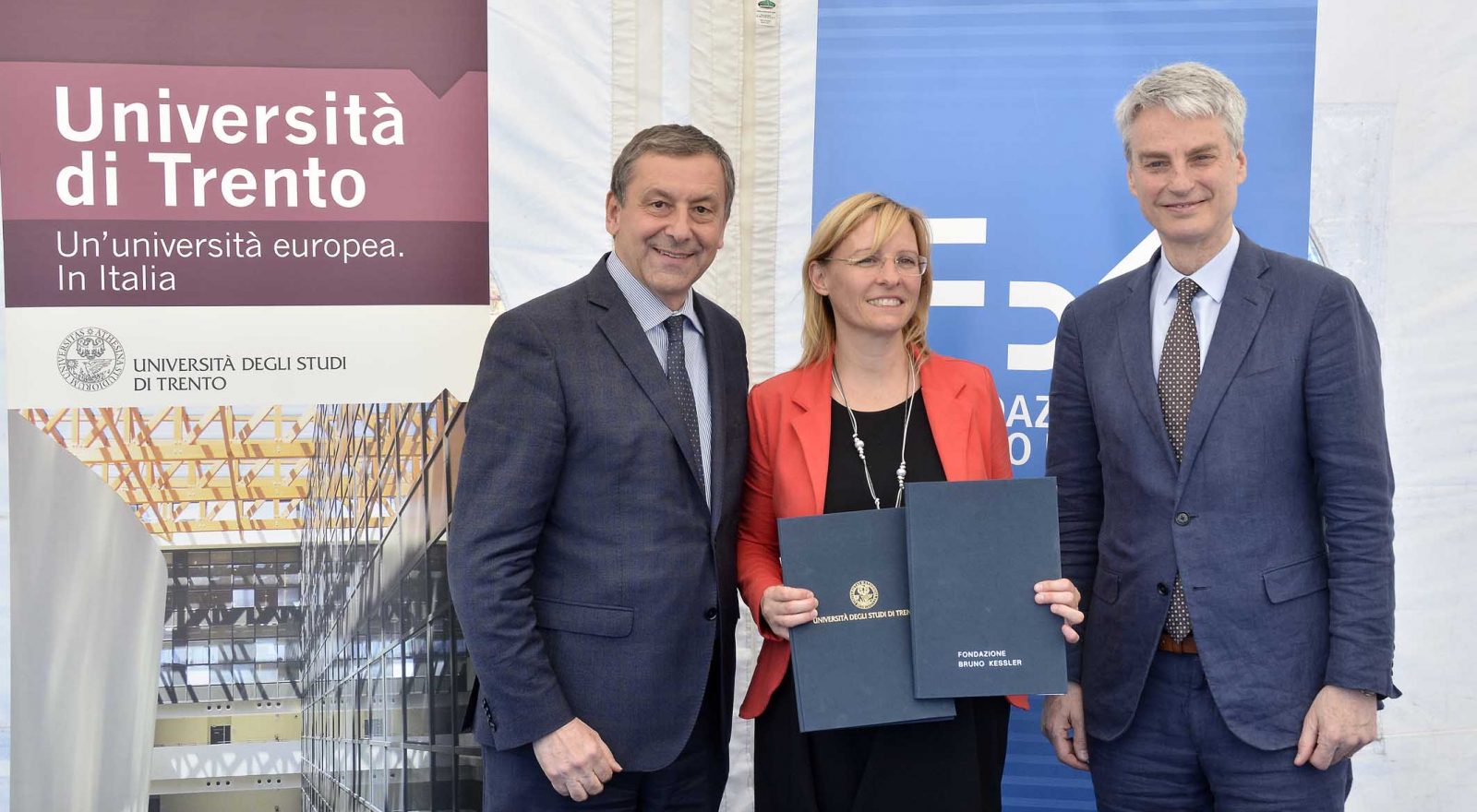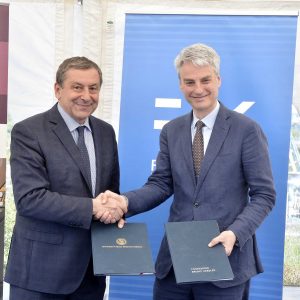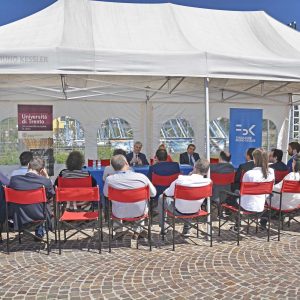Side by side in research and education challenges
The framework agreement between Fondazione Bruno Kessler and University of Trento was signed today
Trento, May 25, 2017 – the framework Agreement signed today in Povo (Trento) by the Chancellor of the University of Trento, Paolo Collini, and the President of Fondazione Bruno Kessler, Francesco Profumo, at the presence of the Councillor for University and research of the Trento Province Government, Sara Ferrari, marks another step in the consolidation of activities between the University and the Foundation for joint research projects and laboratories, as well as for doctoral and master’s programs, and professional master programs.
“The academia and the scientific community,” Councillor Sara Ferrari opened, “must be by their nature permeable, open to discussion. What is happening today with the signing of this agreement proves that our two institutions are really capable of being so. Today’s step is a joint one. We are aware of this and want to act responsibly. It is a symbolic moment for the community as it helps grasp the fact that the Trento hill and all the other education and research organizations are not places like any other. They are vital places, with open doors and windows, that are interesting to the community because they are a source of exchange of views and inspiration. And they draw energy from the local communities, which are an integral part of them, also thanks to the people who make an effort to do networking. Today we are telling what has already been done and making arrangements for what will come: a work that brings strength and openness to our local area and which we now certify with this agreement. ”
‘I’m sure,’ said Francesco Profumo, ‘that if Bruno Kessler had still been among us, he would have appreciated today’s agreement. The University of Trento and Fondazione Bruno Kessler have decided to work even more jointly and formalize this in the protocol signed today, with joint projects for training, research, innovation and internationalization. This ‘Unitn-FBK model’ and the results that may derive from it in terms of the quality of graduates and research and innovation results developed, will give Trentino a greater advantage in the increasingly aggressive competition between local areas. The initial idea of Bruno Kessler, who in 1962 said that Trentino could not grow only with apples but by investing in education, research and internationalization, is today more than ever present and the results are in the eyes of everyone.
“The agreement between us and the Kessler Foundation,” Paolo Collini said, “goes beyond its specific content because is inspired by the idea that our role is to unite, enhancing our diversity and putting together our similarities. It goes far beyond the specific important collaborations that are already in place or that can be imagined today, in that it is inspired by a common strategic vision of our respective roles in the research system. A vision that builds on collaboration and integration as ways to strengthen the ability to be competitive internationally in research quality, in the acquisition of funding and in the effort to translate knowledge into innovation for businesses. ”
The purpose of the agreement, which puts down in black on white the joint efforts and goals, is also to grow collaboration in other research disciplines and to start new joint procedures for dual affiliation positions. In particular, the deal defines areas of collaboration to manage the creation and development of joint research projects and laboratories with possible sharing of research infrastructures between the two institutions. A side-by-side work that, as for training, will see the launch or consolidation of joint doctorate programs and professional master degrees.
The initiatives already underway included in the agreement and which may be further strengthened in the future are numerous: from the analysis of international politics to computational science, from math to the challenge of European competition in the emerging sector of quantum technologies. Not only research, though: the agreement will also cover advanced higher education, with collaborations in research fellowships and the starting of university masters programs.
Below is a review of some of the research activities covered by the agreement.
LABSSAH (Laboratory of Biomarker Studies and Structure Analysis for Health)
A virtuous example of collaborations in place is the LABSSAH (Laboratory of Biomarker Studies and Structure Analysis for Health) laboratory, a joint initiative of Fondazione Bruno Kessler, the Center for Integrative Biology of the University of Trento and the CNR-Trento’s Biophysical Institute, with laboratories based at FBK. Its research activity in the biomedical field (precision medicine) mainly concerns the study of the molecular mechanisms underlying the onset of complex pathologies (oncology, neurodegeneration, hereditary diseases) and the development of systems, such as sensors and micro-devices, for the Purification and detection of biomarkers.
4 researchers from FBK and 4 from UniTrento work at the laboratory, as well as a variable number of collaborators. The lab is attended also by some 60 researchers for research collaborations purposes, and to use scientific equipment in the course of their studies. This scientific production node has led, since 2012 up to date, to the publication of 96 articles in international scientific journals, one filed patent (two more are under examination) and collaboration in 20 funded research projects, thanks also to the construction of the mass sequencing facility (NGS facility). The laboratory recently signed a collaboration agreement with the Edmund Mach Foundation for the sharing of biotechnology platforms and the use of the microscopy facility. As for training, the Laboratory deals with the specialization of young researchers (31, undergraduates and PhD students combined) and its activities have led to the establishment of a biotechnology start-up.
International Center for Mathematical Research (CIRM)
Among the areas covered by the collaboration between institutions, are a space for mathematical research with the definition of a specific agreement between the Department of Mathematics of the University, the International Center for Mathematical Research (CIRM) and the National Institute of Higher Mathematics (INdAM). The purpose of the agreement is to establish a joint research facility, headquartered in Trento, that would provide continuity and further develop the activities carried out by CIRM so far. The expansion of the scientific network will enable new synergies to be started by developing scientific and higher education activities in the field of mathematics, including local impact ones. Among the activities of the new CIRM are the promotion of mathematical research, through seminars, meetings, conferences and advanced schools, as well as through international research and exchange programs that the Laboratory will host. CIRM will also propose a visiting fellow program, offering multiple options, involving annually twenty teachers and professors, who will spend at CIRM a period of at least two weeks in order to conduct research in mathematics and hold seminars and advanced courses in collaboration with the Trento Department and the PhD program, thus offering a richer training program and scientific cooperation.
International Politics Laboratory (IP LAB)
The Laboratory for International Politics, a joint initiative of the two institutions as well, aims to create effective synergy between the main players of research in the Trentino area and to consolidate the visibility of Trentino-based research on these topics on an international scale. Started in 2016, the agreement that established the Laboratory has a duration of nine years, and can be extended. The aim of the Laboratory is to offer the community of Italian academics working on international policy issues a common reference point – not clearly identifiable in the national landscape as of yet – for the design, development and conduction of research projects on topics of high relevance (conflict resolution, peace studies, diplomacy, international cooperation). The objective of the Laboratory is therefore twofold: to maintain the extensive and consolidated network of relationships established by the exploration project in International Policy and Conflict Resolution launched in 2012 by FBK, that would enhance the investment made and continue to systematically direct to Trento the activities of Italian scholars of International Relations; on the other hand, there is the ambition to project abroad – with an ever more common and increasingly recognizable “made in Trentino” label – the work of such group of Italian specialists in international politics.
Interdisciplinary Laboratory of Computational Science (LISC)
As part of an ever-increasing synergy between UniTrento and FBK, the two entities have created a joint laboratory that deals with the study of various physical processes using the techniques and methods of Computational Physics. The mission of the Interdisciplinary Laboratory of Computational Science (LISC) is to provide the context in which scientific and technological challenges in the field of computational sciences can be pursued to the fullest, by favoring and exploiting the interaction and contamination of the various approaches and competences present in the UniTrento Department of Physics and at FBK. In this way, researchers who have gained experience and competences in advanced scientific computation over the years have come together in a consolidated and agile structure. In addition to research, LISC contributes to the enrichment of the Department of Physics’s teaching offering, representing for FBK an opportunity to participate in the field of higher education and in the conduction of courses (master and doctoral degrees) both with supervision and tutoring of students.
LISC is a natural point of reference for university students interested in supercomputing and therefore plays an important role for training purposes. The main scientific areas explored by LISC are: Monte Carlo method applied to electron transport in matter, electronic spectroscopy, optical, electronic and transport properties of nanostructured and functionalized materials, computer-based multiscale models for functionalized surfaces interacting with nucleic acids, damage Induced by low energy electrons on biotissues, dynamics of macromolecules, nuclear and subnuclear physics, algorithmic developments in the Quantum Monte Carlo method, simulation of slow-flow phenomena in soft matter.
Quantum Technology
Summing up the many existing activities, and enhancing them and developing a joint laboratory between UniTrento, FBK and CNR to aggregate competencies in five strategic lines of research. This is the ambitious goal of Q@TN (Quantum at Trento), a proposal for coordinating research, technology transfer and higher education in the field of Sciences and quantum technologies. The Q@TN project, which was officially launched in February this year, aims to connect existing initiatives and create new ones in the name of interdisciplinarity and innovation. Aggregating competencies will help consolidate the international visibility of the Trentino-based organization as a strategic node of reference, from development of knowledge to technology transfer, and enhancing the ability to attract the substantial funding opportunities available for the growth of talent and scientific progress. Q@TN intends to be a spearhead for making inroads into the flagship initiative that the EU will launch in 2018 and that provides funding in the area of quantum science and technology of 1 billion over ten years to help world leadership on the quantum industry stay in Europe.
Q@TN provides for initially opening fifteen positions for young researchers and doctoral students who will develop a research team in each of the five strategic lines of Q@TN. The lines concern theory/esperiments in fundamental quantum physics, quantum communication, quantum computing, platforms for quantum simulators on ultracold gases for various applications, metrology and sensors. The lab, with a wide structure and equipment already present within the single research groups, will have as its primary function to gather scientific and technological skills in the industry in our area, and the intent is for it to become a hub for an infrastructure designed to promote the transfer of knowledge and technology to the local area to promote new applications and new businesses on quantum technology. Q@TN’s premises are open to the participation of key local players involved in research, with an inclusive and multidisciplinary vocation.
The project has been joined by the University of Trento, with its master’s degrees and doctorate programs in scientific-technological areas, and with research groups of its Departments of Physics, Mathematics, Industrial Engineering, Engineering and Computer Science and the interdepartmental Center for Mind/Brain (CIMeC); Fondazione Bruno Kessler (FBK) with the technological competencies of its Center for Information Technology (ICT), and its Center for Materials and Microsystems (CMM), which also has a clean room for the production of microelectronic devices; the European Center for Theoretical Studies in Nuclear Physics and Related Areas (ECT *) under FBK, with its research and coordination activities at European level; the National Research Council (CNR) with its National Institute of Optics (INO), present in Trento with the BEC Center, and with the Institute of Photonics and Nanotechnology (IFN); the National Institute of Nuclear Physics (INFN), through its Trento-based Institute for Fundamental Physics and Applications (TIFPA); the Italian Institute of technology (IIT) with its Rovereto Team active in the field of new technology for Neuroscience.
The Q@TN Center is divided into the following scientific/technological areas that are the action lines in which the Center is engaged: Quantum Communication, Quantum Simulation, Quantum Computing, Quantum Sensors and Metrology, Quantum Sciences.
Here are some initiatives in the field of higher education, covered by the agreement.
PhD programs
87 University of Trento PhD students are conducting their research at FBK under the FBK International PhD Program (phd.fbk.edu) under the supervision or co-supervision of FBK researchers. Moreover, the FBK ICT Center has actively participated for several years now in the PhD program in Information and Communication Technology of the Department of Engineering and Computer Science (DISI) with the participation of 15 FBK researchers as faculty members of the PhD program in Computer Science and Telecommunications at DISI, whose Executive Committee includes two members from FBK. A new way of collaboration between FBK and the University of Trento is starting in 2017: the Department of Psychology and Cognitive Sciences and the FBK ICT Center have applied for co-accreditation in the PhD program in Cognitive science to the Ministry of Education, University and Research (MIUR) This entails an even closer joint management of the PhD program between FBK and the University of Trento. Also, FBK regularly offers PhD scholarships for the Department of Physics, the Department of Industrial Engineering and the Center for Integrative Biology of the University.
Second level Master’s Degree in General Medicine
Another project, connected with education, is the establishment of a II Level Master Degree addressed to General Medicine under the “FBK for Health” program, in cooperation with the local stakeholders: the Provincial Agency for Healthcare Services, the University of Trento, the Medical Association and the School of Special Education in General Medicine. The aim is to contribute to raising the overall level of training available to the local healthcare system and act as a national benchmark for training in general medicine. The Master will be jointly conducted with the FBK for Health Program and will be offered by the University of Trento, involving five Departments (Law, Sociology and Social Research, Psychology and Cognitive Sciences, Economics and Management and the Center for Integrative Biology – CIBIO). The Provincial Agency for Healthcare Services, and the Medical Association of the Trento Province, will also partiipate with the School of Special Education in General Medicine. The Master can count on the financial support of the Autonomous Province of Trento through its Department of Knowledge, of the Health and Social Solidarity Office, the University and Research Office, and the involvement of a private partnership.
Photo service ©GiovanniCavulli for UniTrento and images by the PAT Press Office



